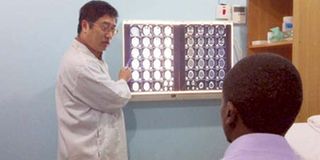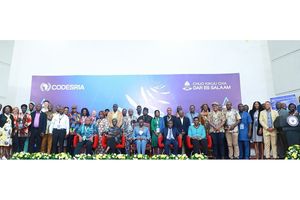Tanzania short of neurosurgeons

Dr Jun Kong, a neurosurgeon, demonstrates something related to the speciality at one of his sessions with patients at the Aga Khan Hospital in Dar es Salaam. PHOTO| SYLIVESTER ERNEST
What you need to know:
- Neurology is a medical speciality concerning the prevention, diagnosis, treatment and rehabilitation of disorders that affect the entire nervous system, including the brain, spinal column, spinal cord, peripheral nerves, and extra-cranial cardiovascular system.
Dar es Salaam. Neurological disorder is among many health-related challenges facing Tanzanians today, signalling that it needs serious attention.
Neurology is a medical speciality concerning the prevention, diagnosis, treatment and rehabilitation of disorders that affect the entire nervous system, including the brain, spinal column, spinal cord, peripheral nerves, and extra-cranial cardiovascular system.
Tanzania has severe shortage of neurosurgeons, with roughly one neurosurgeon attending to 10 million people, far below the World Health Organisation (WHO)’s standard of one to four thousand. Even though hospitals are recruiting and acquiring resources to battle this threatening deficit, more needs to be done by other stakeholders.
Last year, the Aga Khan Hospital in Dar es Salaam attempted to fill this gap by recruiting Dr Jun Kong, to cope with the growing shortage of neurosurgeons in the country. Dr Kong’s recruitment aligns with the Aga Khan Hospital’s Phase Two Development Plan.
The plan includes the establishment of a comprehensive cardiology programme, oncology services, and selected aspects of neurosciences.
The plan will also see the expansion of various existing services, including diagnostic imaging, orthopaedics and trauma, critical care, paediatrics and obstetrics.
The overall increase in scope of tertiary services provided by the hospital will contribute to improve healthcare delivery in an effort to address the growing trends of non-communicable diseases (NCDs) requiring more attention and specialised care.
This will be accomplished largely by recruiting qualified healthcare professionals. In the case of neuroscience, this means having a neurophysiology lab as well as a new neurosurgery theatre.
“The Aga Khan Hospital is working hard to acquire state-of-the-art technologies that will enable the provision of a broad range of services and surgeries here at home,” said Dr Jaffer Dharsee, Medical Director at the Aga Khan Health Service in Dar es Salaam.
The marketing officer at the Aga Khan Hospital Olayce Lotha said:
“As a stakeholder in the country’s health sector, the Aga Khan Hospital has the responsibility of assisting the government and its citizens to decrease costs associated with receiving treatment and care for complex surgeries in foreign countries.”
Driven by this vision, a number of complicated cases, including tumour removal, pituitary surgery, trigeminal neuralgia, acoustic neuroma, meningioma surgery, skull base surgery and hydrophelus, can now be treated within the country.
In a brief interview in his office, Dr Kong said: “During my 20 years of practising neurosurgery after graduating from Qingdao Medical College, I have continued to gain more experience in brain injury, brain tumour surgeries and brain vessel diseases.”
Prior to joining the Aga Khan Hospital, he came to Tanzania under a Chinese-Tanzanian technical cooperation and worked with the Muhimbili Orthopaedic Institute (Moi) for four years.




